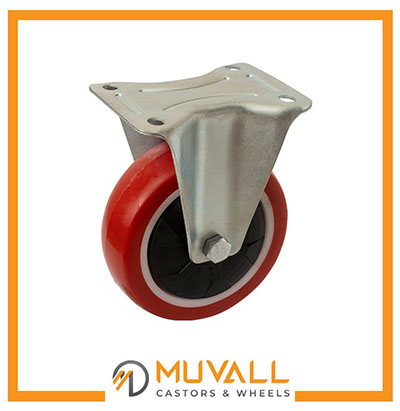In the bustling world of manufacturing, efficiency, reliability, and safety are paramount. Every component within a facility plays a crucial role in ensuring smooth operations, and heavy-duty castor wheels are no exception. These robust wheels are essential for transporting heavy loads, machinery, and equipment across factory floors, warehouses, and production lines. In this blog, we’ll explore the importance of heavy-duty castor wheels in manufacturing facilities, highlighting their benefits, applications, and the role of castor wheel manufacturers in providing industrial-strength solutions.
Understanding Heavy-Duty Castor Wheels
Heavy-duty castor wheels are specialized wheels designed to withstand the rigorous demands of industrial environments. Unlike standard castor wheels, which are typically used for lighter loads and smoother surfaces, heavy-duty castor wheels are engineered to support heavy loads, resist wear and tear, and navigate rough terrain with ease. These wheels are constructed from durable materials such as steel, nylon, or polyurethane and are available in various sizes, load capacities, and configurations to suit different applications.
Benefits of Heavy-Duty Castor Wheels
The importance of heavy-duty castor wheels in manufacturing facilities cannot be overstated. Here are some key benefits:
1. Load Capacity: Heavy-duty castor wheels are designed to support significantly higher loads compared to standard wheels, making them ideal for transporting heavy machinery, equipment, and materials within a facility.
2. Durability: With their robust construction and durable materials, heavy-duty castor wheels are built to withstand the harsh conditions of industrial environments, including heavy loads, rough surfaces, and exposure to chemicals and contaminants.
3. Reliability: Heavy-duty castor wheels offer reliable performance, ensuring smooth and efficient transportation of goods and equipment across factory floors and production lines, minimizing downtime and maximizing productivity.
4. Versatility: These wheels are available in a variety of configurations, including swivel, rigid, and locking options, allowing for flexible movement and precise positioning of loads in manufacturing facilities.
5. Safety: Heavy-duty castor wheels play a crucial role in ensuring workplace safety by providing stable support for heavy loads and equipment, reducing the risk of accidents and injuries caused by unstable or inadequate transport systems.
Applications of Heavy-Duty Castor Wheels
Heavy-duty castor wheels find applications in various areas within manufacturing facilities, including:
1. Material Handling: These wheels are used for transporting raw materials, finished products, and components between different areas of the facility, such as warehouses, production lines, and storage areas.
2. Machinery and Equipment: Heavy-duty castor wheels provide mobility and support for heavy machinery, equipment, and tools, allowing for easy relocation and reconfiguration of production areas as needed.
3. Pallet Trucks and Carts: These wheels are commonly used on pallet trucks, carts, and dollies for moving heavy pallets, containers, and other loads within the facility.
4. Assembly Lines: Heavy-duty castor wheels are integrated into conveyor systems and assembly lines to facilitate the movement of workpieces, components, and finished products during the manufacturing process.
5. Industrial Trolleys: These wheels are installed on industrial trolleys and platforms for transporting heavy loads and equipment throughout the facility, providing mobility and flexibility in material handling operations.
Role of Castor Wheel Manufacturers
Castor wheel manufacturers play a critical role in providing heavy-duty solutions tailored to the specific needs of manufacturing facilities. These manufacturers utilize advanced engineering and manufacturing techniques to produce high-quality castor wheels that meet the stringent requirements of industrial applications. Some key aspects of their role include:
1. Customization: Castor wheel manufacturers work closely with manufacturing facilities to understand their unique requirements and provide customized solutions tailored to their specific applications, load capacities, and environmental conditions.
2. Quality Assurance: Manufacturers implement rigorous quality control measures to ensure that each heavy-duty castor wheel meets the highest standards of performance, durability, and safety, adhering to industry regulations and standards.
3. Innovation: Manufacturers continuously innovate and develop new technologies and materials to improve the performance, efficiency, and longevity of heavy-duty castor wheels, keeping pace with advancements in manufacturing and industrial automation.
4. Technical Support: Manufacturers offer technical support and expertise to assist manufacturing facilities in selecting the right castor wheels for their applications, providing guidance on load capacities, wheel configurations, and installation methods.
Castor Wheel Manufacturers in India
Castor wheel manufacturers in India produce a variety of wheels for industrial, commercial, and residential applications. Offering durable and versatile solutions, they cater to diverse needs with precision engineering. With a focus on quality and innovation, these manufacturers contribute to the mobility solutions market locally and internationally.
Conclusion
In conclusion, heavy-duty castor wheels are indispensable components in manufacturing facilities, providing essential mobility, support, and reliability for transporting heavy loads, machinery, and equipment across factory floors and production lines. Their durability, versatility, and safety features make them invaluable assets in optimizing material handling operations and ensuring smooth and efficient manufacturing processes. With the expertise and support of castor wheel manufacturers, manufacturing facilities can confidently rely on heavy-duty castor wheels to meet their demanding requirements and achieve their productivity goals, driving industrial strength and success in the dynamic world of manufacturing.





